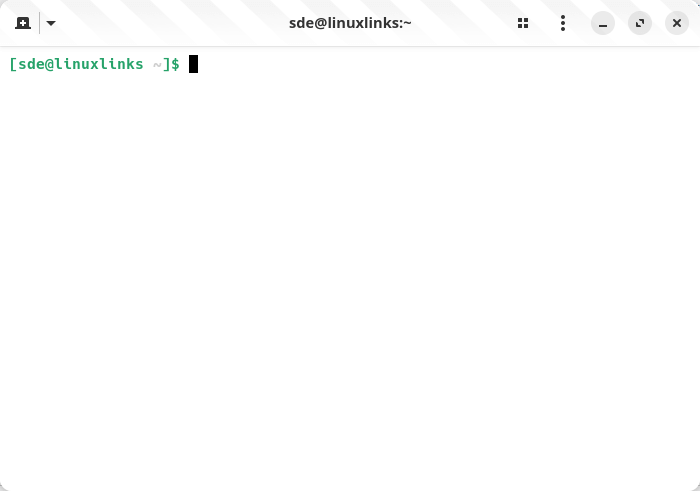Ptyxis is a terminal for GNOME with first-class support for containers.
Flatpak is the intended and preferred distribution mechanism.
This is free and open source software.
Features include:
- Built-in support for profiles allows for many of those preferences to be tweaked on a more fine-grained basis.
- Specify a default container per-profile or to inherit the current terminal’s container.
- Flatpak’able without losing features! This works through the use of a specialized ptyxis-agent that runs on the host to provide Ptyxis the ability to create PTY devices which integrate better with containers.
- A number of palettes are provided with native support for light/dark mode and can update with your desktop style preference.
- Due to how ptyxis-agent works, it can perform various foreground process tracking for things like sudo or SSH without significant overhead. This requires some improvements in various container systems which is in the process of merging at the time of writing.
- Tab overview using modern libadwaita features.
- Transparency support does exist but must be tweaked manually using GSettings until better transitions can be implemented in libadwaita.
- Use of libadwaita “Toasts” to notify the user when the clipboard has been updated as well as other operations.
- Various tweaks to how VTE draws which are performed by rewriting the retained render tree. This allows for appropriate padding around the terminal while still keeping scrollback from looking cut off.
- User customizable keyboard shortcuts.
- “Single application mode” allows you to run an application in a ptyxis instance but just for that command. Useful when integrating with .desktop files containing Terminal=true.
- Pinned tab profile/container/directory are saved across sessions so that you can get back to your projects quickly. Currently this is restricted to a single window but may change in the future.
- ptyxis-agent will automatically create systemd scopes for your tab when available to help reduce the chances that the whole app would be killed by the OOM killer instead of the tab taking up resources.
- An terminal inspector to help you debug issues when writing applications for the terminal.
- There are situations where users have particular needs for integrating with external systems. Preferences allow for tweaking a number of these compatibility options.
Website: gitlab.gnome.org/chergert/ptyxis
Support:
Developer: Christian Hergert
License: GNU General Public License v3.0

Ptyxis is written in C. Learn C with our recommended free books and free tutorials.
| Popular series | |
|---|---|
| The largest compilation of the best free and open source software in the universe. Each article is supplied with a legendary ratings chart helping you to make informed decisions. | |
| Hundreds of in-depth reviews offering our unbiased and expert opinion on software. We offer helpful and impartial information. | |
| The Big List of Active Linux Distros is a large compilation of actively developed Linux distributions. | |
| Replace proprietary software with open source alternatives: Google, Microsoft, Apple, Adobe, IBM, Autodesk, Oracle, Atlassian, Corel, Cisco, Intuit, and SAS. | |
| Awesome Free Linux Games Tools showcases a series of tools that making gaming on Linux a more pleasurable experience. This is a new series. | |
| Machine Learning explores practical applications of machine learning and deep learning from a Linux perspective. We've written reviews of more than 40 self-hosted apps. All are free and open source. | |
| New to Linux? Read our Linux for Starters series. We start right at the basics and teach you everything you need to know to get started with Linux. | |
| Alternatives to popular CLI tools showcases essential tools that are modern replacements for core Linux utilities. | |
| Essential Linux system tools focuses on small, indispensable utilities, useful for system administrators as well as regular users. | |
| Linux utilities to maximise your productivity. Small, indispensable tools, useful for anyone running a Linux machine. | |
| Surveys popular streaming services from a Linux perspective: Amazon Music Unlimited, Myuzi, Spotify, Deezer, Tidal. | |
| Saving Money with Linux looks at how you can reduce your energy bills running Linux. | |
| Home computers became commonplace in the 1980s. Emulate home computers including the Commodore 64, Amiga, Atari ST, ZX81, Amstrad CPC, and ZX Spectrum. | |
| Now and Then examines how promising open source software fared over the years. It can be a bumpy ride. | |
| Linux at Home looks at a range of home activities where Linux can play its part, making the most of our time at home, keeping active and engaged. | |
| Linux Candy reveals the lighter side of Linux. Have some fun and escape from the daily drudgery. | |
| Getting Started with Docker helps you master Docker, a set of platform as a service products that delivers software in packages called containers. | |
| Best Free Android Apps. We showcase free Android apps that are definitely worth downloading. There's a strict eligibility criteria for inclusion in this series. | |
| These best free books accelerate your learning of every programming language. Learn a new language today! | |
| These free tutorials offer the perfect tonic to our free programming books series. | |
| Linux Around The World showcases usergroups that are relevant to Linux enthusiasts. Great ways to meet up with fellow enthusiasts. | |
| Stars and Stripes is an occasional series looking at the impact of Linux in the USA. | |
